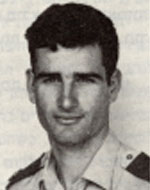Zevulun, son of Chana and Benzion, was born on Kibbutz Ein Hamifratz on November 24, 1945, and passed all the stages of the kibbutz’s growth – from kindergarten to elementary school until the end of the Naaman Regional High School. From an early age he was gifted with the real professions – mathematics and physics, and as a hobby he liked to dismantle and build electronic devices. In contrast, his deep love for music, especially for classical music, and for many hours he sat in the house of culture and listened to records. Zevulun, or for the sake of brevity and affection Zebuli, was an outstanding athlete and preferred the volleyball game to all sports. Zevulun was a “wild man,” as the caretaker testified from the children’s home. Once he hit the door, immediately grabbed a broom and hit the door with tremendous blows, as punishment. He testified that he “loved the details, the accuracy, the music of Bach, everything measured in it and considered perfect.” As a child, he was very strict and self-contained – playful and imaginative. Then he began to grow, and began to take things seriously. With perseverance and will, he achieved achievements in playing and flying, in a new kind of maturity that suddenly grew up in him. Then he also discovered the love of mathematics and physics, of beauty and painting, and of the innumerable possibilities of independent thought-an independent but systematic thought. As required in the exact sciences. For him it was an experience to play with numbers, to display them, to entertain them, to go wild in them in narrow, wide circles. When he was 14, his mother became seriously ill, a fact that deeply affected his personality and the course of his life. “Is, she is the pivot, around which the family moves,” he said. “It is the unifying and closing bolt in all its details, a mother peeling grapefruit, which tells stories, serving sandwiches with radishes and lettuce.” His mother died when he was Zevulun in an officers’ course. In the institutions of the youth society was not active. They offered him to participate in the committees but he refused. There was intense criticism, uncompromising, individual ambition, and all of this prevented him from being one of the generalities. “Zebuli had a curious and inquisitive mind,” his friends said. “His thinking was systematic and thorough – to discover the problem, to win it in precise wording and to find the solution.” His motto was: What is real is also logical. Zvulun was drafted into the Israel Defense Forces in late November 1964, served as a member of the IDF’s Nahal Brigade and was assigned to the infantry corps, and during his regular service he underwent a course for infantry commanders and a course for ” R. In basic training, and in both courses he was awarded an outstanding apprentice degree. At the beginning of basic training, a defect was discovered in his blood flow. He was hospitalized and underwent surgery, and his health level was classified as low. In his stubbornness, he refused to be considered to be physically fit. He so “nagged” the doctors and showed them that he was healthy, until they returned and gave him a high profile. When his release came, after the Six-Day War, he suddenly remembered the love of his old youth – the pilot. He volunteered for a career army and was transferred to the air force. As part of his career he underwent a parachuting course, an advanced aviation course and a flight instructor course. In the opinion of his commanders, it was said: “A good and mature officer in his soul, capable, dedicated, responsible and enterprising.” “I finished the army as a lieutenant,” Zevulun said, “but I’m very unhappy, I said to myself – I have to pilot this time, or not at all.” The beginning was difficult, fraught with crises and tension, but Zevulun clung to his new task. “When we chose him, in an aviation course, to the cadets’ headquarters, he refused.” His friends recall. “He did not want this position, he did not want to stand out, but we knew that because of his character and his previous experience, there was no suitable for him. During those years, he married Yehudit, whom he wrote in terms of pilots: “Juditha, if we were both birds, we could meet all of usEvery day … “During the War of Attrition, their son Yuval was born:” To Yehudit I said: He is a monkey like you, the first time I saw him. “Knowing that Yuval was born without telling anyone, Zevulun decided to leave the kibbutz, and he loved the kibbutz very much, but there was no compromise and the kibbutz had to compromise, and he also wanted to advance in the air force and see his future there. His friends say, “he preferred to read professional literature, to participate in various conferences, to play with his little son and to build furniture for his home.” When the Yom Kippur War broke out, the squadron was ready, On June 13, 1973, two Phantoms set out for a special mission: Zevulun sat with Zevulun, one of his comrades, and returned to Egypt shortly after the war. He was brought to rest in the cemetery of Kibbutz Ein Hamifratz, leaving behind a wife, a son, a father and two sisters: “Zaboli did not hang around the club, ready to pat his shoulder. He was the first in our squadron to be shot down by MiG 21. He did not discuss it either. We needed time to convince him that he had indeed dropped the MiG, in a particularly noteworthy operation, to move from one attack to another. Zebuli, it should be said was too modest. But some pilot! “In his memory, the family published a booklet containing his life story and the story of his death.
